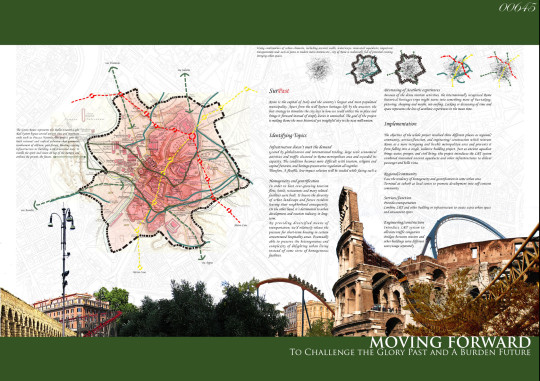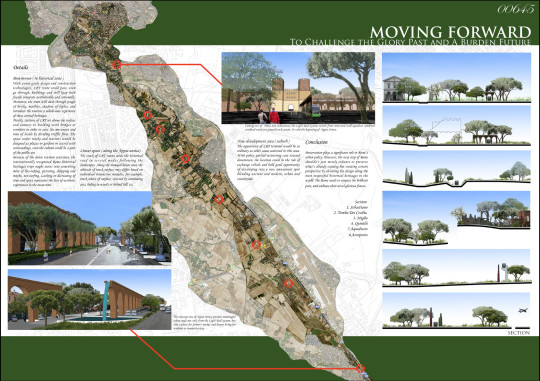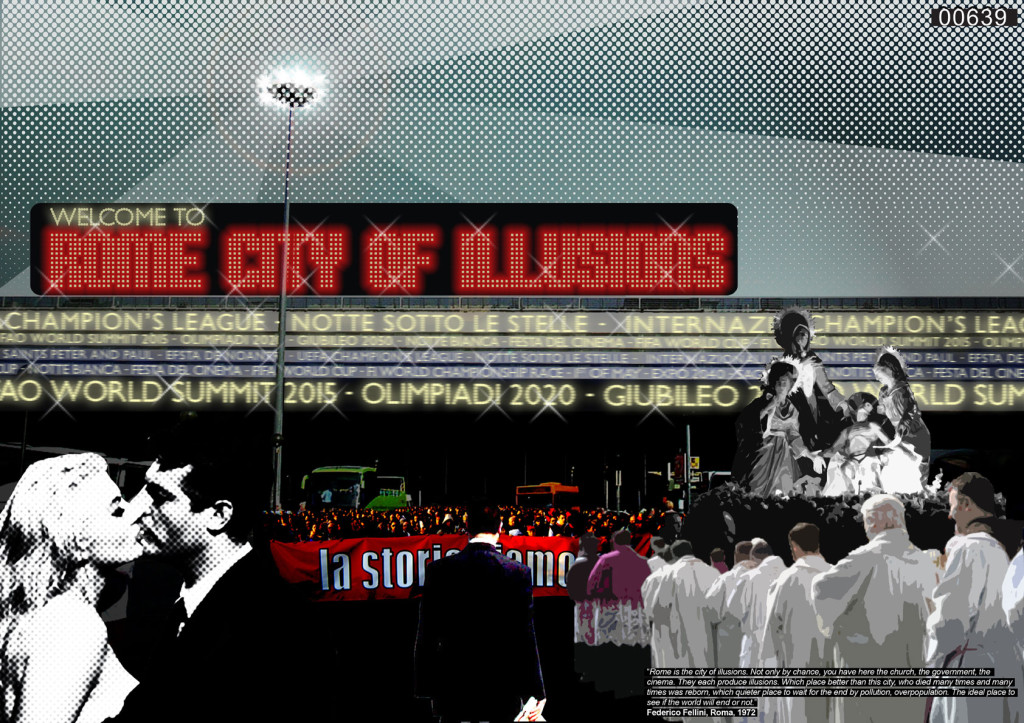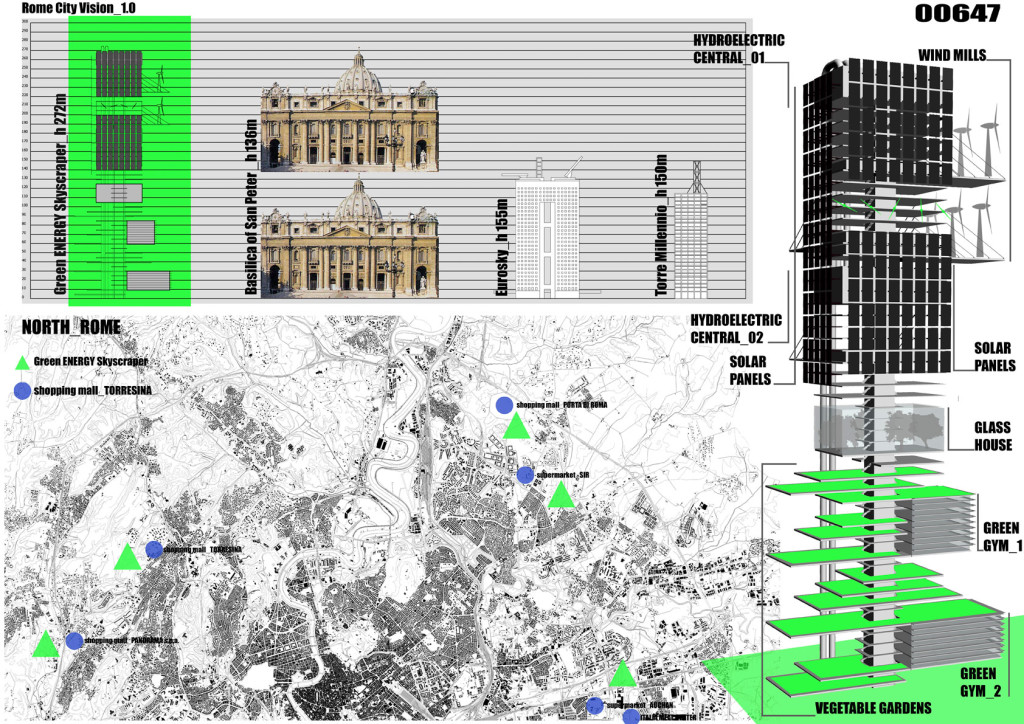Info:
Title: Moving Forward - Code: 00645Contest: Rome / 2010
By: Po-Hao Chen / Yung-wei Liu / Edward K. Crimson
Views: 2479 Likes: 0
Votes:
JUERGEN MAYER H. 0 FRANCESCO LIPARI2 FELIPE ESCUDERO1 FRANCESCO GATTI 7 MICHAEL CATON 32.6
Moving Forward


MOVING FORWARD
To challenge the glory past and a burden future
Introduction
Romeis the capital ofItalyand the country’s largest and most populated municipality. Apart from the well known heritages left by the ancestor, the best strategy to stimulate the city lays in how we could utilize the in place and brings it forward instead of simply leaves it untouched. The goal of the project is makingRomethe most historical yet insightful city in the next millennium
Roma does have splendid heritages, equally on annual statistics of foreigner and domestic tourists. With plenty of preservative zones, how would Roma face her next millennium?
Topic identifying
A. Infrastructure doesn’t meet the demand
Geared by globalization and international trading, large scale economical activities and traffic clustered in Roma-metropolitan area and exceeded its capacity. The condition becomes more difficult with tourism, religion and capital function, and heritage-preservative regulation all together. Therefore, A flexible, low-impact solution will be needed while facing such a complicated circumstance.
B. Homogeneity and gentrification
In order to host ever-growing tourism flow, hotels, restaurants and many related-facilities were built. It lowers the diversity of urban landscape and forces resident leaving their neighborhood consequently. On the other hand, it’s detrimental to urban development and tourism industry in long-term. By providing diversified means of transportation, we’d relatively release the pressure for short-term housing in certain concentrated hospitality areas. Eventually able to preserve the heterogeneous and complexity of delighting urban living instead of some sorts of homogeneous facilities.
C. Decreasing of aesthetics experiences
Because of the dense tourism activities, the internationally recognizedRomehistorical heritages trips might turns into something more of bus-taking, picturing, shopping and maybe, net-surfing. Lacking or decreasing of time and space represents the loss of aesthetic experiences in the mean time.
Concept Implementation
The objective of the whole project involved three different phases as regional/community, services/function, and engineering/ construction which reinventRomeas a more intriguing and livable metropolitan area and prevents it from falling into a single, isolative building project. Just as ancient aqueduct brings water, prosper, and civil living; this project introduces the LRT system combined renovated ancient aqueducts and other infrastructures to deliver passenger and bella vista.
| Regional/community | n Easy the tendency of homogeneity and gentrification in some urban arean Terminal at suburb as local centre to promote development into self-content community |
| Services/function | n Provides transportationn Combine LRT and other building to create extra urban space and amusement spots |
| Engineering/construction | n Introduce LRT system to alleviate traffic congestionn Bridges between station and other buildings serve different users separately |
Details
A. Downtown ( historical zone)
With avant-garde design and construction technologies, LRT route could pass, even go through, buildings and still keep both façade integrate aesthetically and rationally. Moreover, the train will dash through jungle of bricks, marbles, shadow of lights, and introduce the tourists a whole-new experience of these eternal heritages.
Mostly, stations of LRT set above the surface and connect to building with bridges or corridors in order to save the movement and time of locals by dividing traffic flow. The space under tracks and stations would be designed as plazas or gardens in accord with surroundings, even the column could be a part of the public art.
B. Linier space ( the Appia Antica)
The track of LRT roams aside the historical road in several modes following the landscapes. Along the tranquil linear area, the altitude of track surface may differ based on individual interactive modules, for example, track above of surface, covered by continuing arcs, hiding in woods or behind hill, etc.
C. New-development area ( suburb )
The appearance of LRT terminal would be as ordinary as other casas scattered in this area. With policy partial-restricting cars toward downtown, the location could be the role of exchange vehicle and hold good opportunity of developing into a new amusement spot blending ancient and modern, urban and countryside.
Preservation plays a significant role inRome’s urban policy. However, the next step ofRomeshouldn’t just merely enhance or preserve what’s already existing but creating certain prospective by elevating the design along the most respectful historical heritages in the world. TheRomeneeds to surpass the brilliant past, and embrace their novel glorious future.






